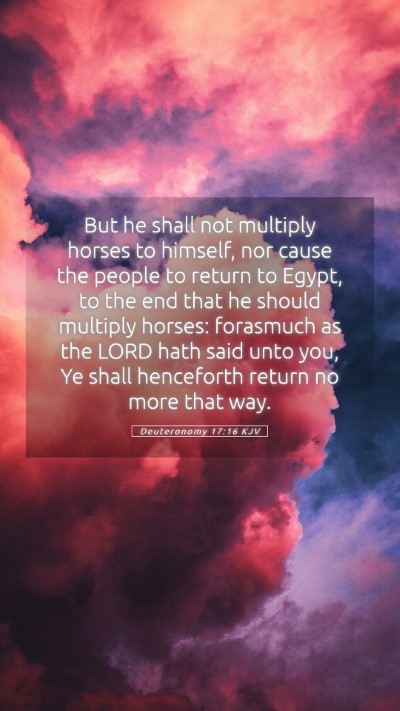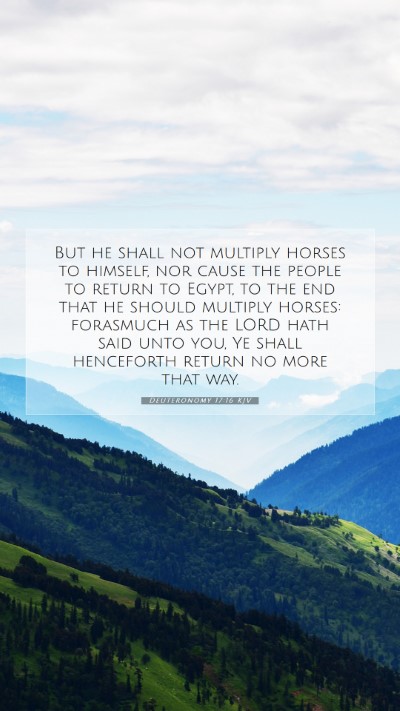Understanding Deuteronomy 17:16 - A Comprehensive Commentary
Bible Verse: Deuteronomy 17:16 - "But he shall not multiply horses to himself, nor cause the people to return to Egypt, to the end that he should multiply horses: forasmuch as the LORD hath said unto you, Ye shall henceforth return no more that way."
Verse Overview
This verse is part of God's instructions regarding the future kings of Israel, emphasizing the necessity of dependence on God rather than military alliances or foreign powers. The divine mandate warns against accumulating horses, which symbolize wealth, power, and military strength.
Insights from Commentaries
-
Matthew Henry's Commentary
Matthew Henry indicates that Israel's kings should not rely on worldly power and might, which is represented by the accumulation of horses. Instead, their strength should come from God. He highlights that returning to Egypt, a symbol of oppression and reliance on human strength, was a direct contradiction to God’s deliverance of Israel from bondage.
-
Albert Barnes' Notes
Albert Barnes elaborates on the prohibitions against multiple horses, seeing it as a reflection of the king's heart being turned away from trusting in God. He notes that Egypt represented a place of captivity and that the emphasis is on maintaining faith and not reverting to past dependencies for safety or stability.
-
Adam Clarke's Commentary
Adam Clarke provides a historical context, explaining that horses were often associated with military conquests and an armed force. He emphasizes that the king's reliance should be placed solely on the providence of God rather than on significant military assets, which could lead to a detachment from divine dependence.
Key Themes and Messages
- Divine Dependence: The core message emphasizes trust in God's provision versus reliance on military strength.
- Rejection of Worldly Power: Accumulating horses symbolizes a neglect of spiritual values and an inclination towards earthly power.
- Historical Context: Reflecting on Israel's past, the command cautions against returning to former allegiances that led to bondage.
- God's Sovereignty: The verse underlines the belief that God is the ultimate protector and provider for His people.
Application for Today
In the modern context, this verse challenges believers to examine what they place their trust in—be it wealth, resources, or human capabilities. It encourages a lifestyle of faith where reliance is placed in God’s guidance and strength rather than in self-sufficiency or worldly securities.
Cross References
- 1 Kings 10:28-29: Discusses Solomon's accumulation of horses and its implications.
- Isaiah 30:1-3: Warns against trusting in Egypt for help.
- Psalms 20:7: Highlights the contrast between chariots and horses versus trusting in the name of the Lord.
Conclusion
Deuteronomy 17:16 serves as a profound reminder of the importance of placing our faith entirely in God instead of succumbing to the allure of material or military confidence. This verse provides rich insight into how believers can navigate their faith journey by understanding the significance of spiritual reliance over worldly support.
For those studying this text, whether in Bible study groups or through online Bible study resources, it highlights the necessity of integrating God's principles into daily life, assuring that understanding Scripture leads to wise applications of His truths.


